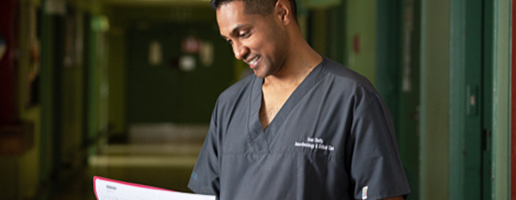Easing the mental health hardships of rural mothering

Dr Nokwazi Mtshengu’s Discovery Fellowship Award is helping her translate to isiXhosa a globally accredited psychiatric tool to assess postpartum depression, which will benefit depressed mothers, the infant, family and broader community.
Psychiatry registrar Dr Nokwazi Mtshengu hated accounting. The 29-year-old saw herself more as a “science-head” at high school yet in matric, she passed accounting with a distinction. Her ability to persevere in the face of difficulty has stood her in great stead in her career. She’s currently in an exciting research phase as she assesses and translates into isiXhosa a globally accredited psychiatric tool used to assess postpartum depression. She credits her late mother Sylvia, a high-school teacher, with instilling in her a fierce determination never to give up.
“I had no idea why I was torturing myself with accounting. I really struggled and wanted to change it as a subject in Grade 11. My mum refused. Instead, she guided me on how to overcome the challenge. Needless to say, it was one of the subjects for which I got a distinction in matric,” she says.
Hardships inspire an interest in mental health
Soon afterwards, Dr Mtshengu had to adapt to a far more fundamental challenge – losing both her parents in quick succession. She grew up in a loving home as an only child in Flagstaff in the Eastern Cape and later in Margate, KwaZulu-Natal. Her father, an inspector of education and a property investor, died of poisoning in 2012 and her mother of a stroke a year later. Her father’s death coincided with her final-year qualification in medicine; her mother’s with an orthopaedic rotation block during her internship at Grey’s Hospital in Pietermaritzburg.
“It was a very difficult time. With my mother’s passing, the consultants I was working with at Grey’s were supportive – I could not function optimally and missed several days. It probably contributed to me leaning towards psychiatry and a therapeutic direction,” she says.
The female patients she is helping to treat in the Psychiatric Department at Dora Nginza Hospital in Port Elizabeth have become a source of great inspiration and joy to Dr Mtshengu.
This specialisation is a privilege
“This specialisation is a privilege – it’s the ultimate opportunity to help others. I love working to improve the mental healthcare of all people in their most vulnerable times – and address the associated stigma. People can be overlooked and stigmatised, because the scar is often not physical,” she explains.
It has been challenging for her to balance extended family, full-time study and work since starting the registrar programme. Yet, for Dr Mtshengu, there is nothing better than seeing patients who, after a long battle with mental illness, get better.
“We don’t see much acute illness. Most people have suffered for so long that they and their families have adapted and found ways of coping with the disability. When they present, they have often given up. So, we obviously get some amazing responses. Seeing them get better after suffering for so long with something they thought was incurable is more uplifting than words can explain,” she says earnestly.
Improved diagnosis and referral
Dr Mtshengu and her colleagues assess often illiterate patients who speak only isiXhosa, using the English-language Edinburgh Postnatal Depression Scale questionnaire. Both this diagnostic instrument and the more general depression diagnostic tool, The Mini-International Neuropsychiatric Interview, are fraught by difficulties in patient understanding and self-reporting.
Her MMed research at Walter Sisulu University aims to translate and render the depression scale questionnaire more understandable for her patients, enabling more accurate depression diagnoses and facilitating prompt referrals. “My team will check responses against the English version for reliability of scores and test-taking behaviour. Work in South Africa has mainly been focused on cross-cultural validation, reliability, specificity and correlation to diagnostic manuals – it’s unclear to me why a translation took so long,” she says.
Symptoms being over- or underestimated or missed altogether
Worldwide, perinatal depression affects 15% to 20% of women after childbirth. It is a significant public health problem in South Africa, where the rate among women in relative poverty is three times that of high-income countries. Unfortunately, perinatal depression often goes undetected. While the depression questionnaire was translated into isiXhosa for a previous sample study in Khayelitsha, Dr Mtshengu’s patients come from an arguably more poverty stricken and far more rural setting, with its own unique challenges.
Another passion of hers is the psychoeducation of families and the patient’s support system. “Families typically live with the patient, so their inclusion in the management plan is important. They can become an extra set of eyes to notice early warning signs of relapse and minimise the risk to the baby and mother,” she explains. Dr Mtshengu expects her work to improve identification, referral, proper diagnosis and treatment of perinatal depression, not only on her home turf, but far wider afield.
About the Discovery Foundation
The Discovery Foundation is an independent trust with a clear focus to strengthen the healthcare system by ensuring that more people have access to specialised healthcare services.
Since 2006, the Discovery Foundation has invested more than R230 million in training and support for more than 400 medical specialists and institutions. The grants support academic research and clinical science, sub-specialist training, rural medicine as well as programmes to develop public healthcare resources. For 2019, Discovery Foundation awarded 42 grants to medical specialists working in South Africa’s healthcare sector to the value of R27 million.
Learn more and apply for the 2020 Discovery Foundation Awards.
Related articles

Vitamin deficiency evidence – a likely gamechanger in mental health
Megan Schultz’s research on the nutritional state of mentally ill patients could significantly improve the lives of many people, especially if bolstered by evidence-based policies and changes in nutrition-related laws.

Persevering against the odds to save critically ill children
Sometimes a single carefully focussed intervention – like funding the training of an intensivist for an under-staffed, under-equipped intensive care unit at the Nelson Mandela Academic Hospital in Mthatha – can be the catalyst for dynamic change.

Dr Chetty embraces the chance to ease SA’s pain burden
Since arriving in Boston on June 2019 to study pain management, anaesthesiologist Dr Sean Chetty is slowly settling into the new way of life – and is excited about what his Discovery Fellowship-funded year has in store.